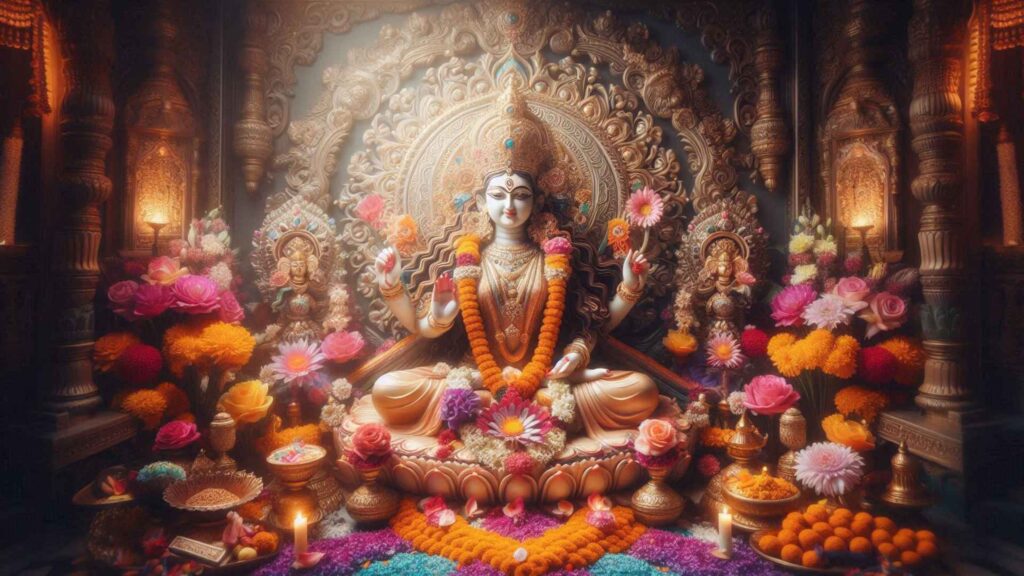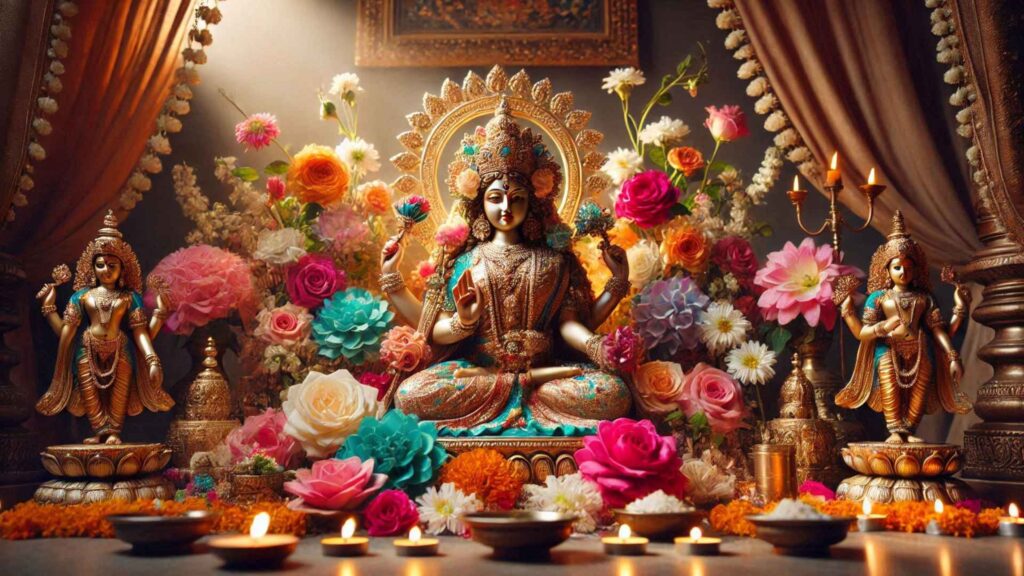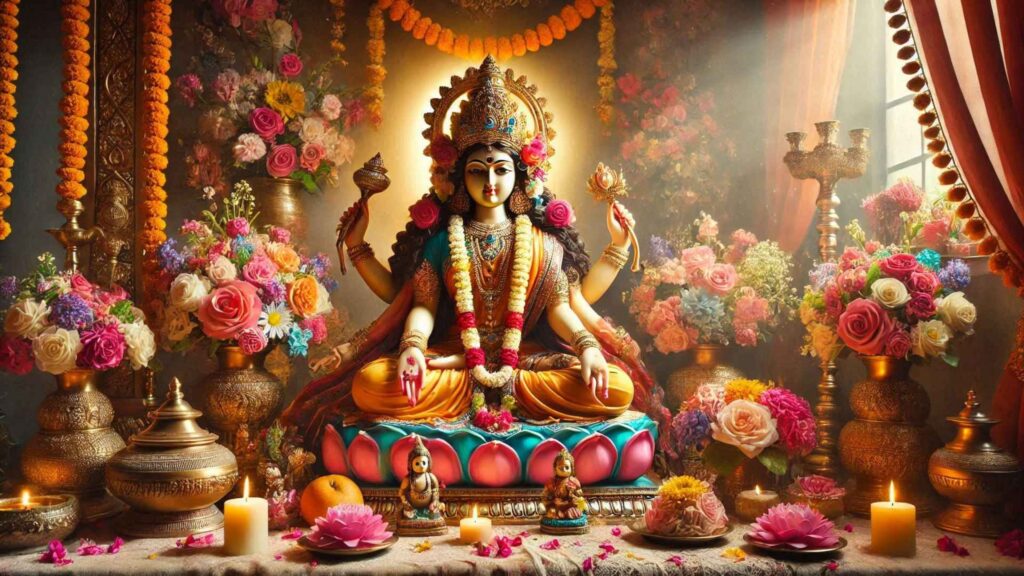Jyotiba: The Warrior God and Protector of Dharma
Introduction
Jyotiba, also known as Jyotirlinga or Khandoba in some regions, is a revered deity in Hinduism, celebrated for his role as a warrior god and a protector of dharma (righteousness). Primarily worshipped in Maharashtra, Karnataka, and Goa, Jyotiba is regarded as an incarnation of Lord Shiva with qualities reminiscent of Lord Vishnu. His divine purpose includes the protection of devotees, the destruction of evil, and the establishment of righteousness.
Read More About Deities And Gods
Often depicted as a powerful and benevolent deity, Jyotiba is especially venerated by farmers, shepherds, and the working class. His temples are centers of devotion and cultural celebration, attracting millions of devotees annually.
Significance of Jyotiba in Hinduism
In Daily Hindu Life
Jyotiba is invoked for protection, prosperity, and success in life. He is a guiding force for his devotees, helping them overcome challenges and aligning their lives with dharma. His worship fosters community bonding, reflecting his role as a unifying force.
Cosmic and Spiritual Importance
Jyotiba represents the eternal battle between good and evil, symbolizing the triumph of righteousness over chaos. His cosmic role includes maintaining balance in the universe and ensuring the well-being of all beings. Spiritually, he inspires courage, selflessness, and devotion.
Names and Etymology

Meaning of Jyotiba
The name “Jyotiba” combines:
- Jyoti: Light, symbolizing enlightenment and divine radiance.
- Ba: A term of endearment, signifying his compassionate nature.
Other Names of Jyotiba and Their Significance
- Khandoba: A form of Shiva worshipped as a protector and family deity.
- Malhari: Reflecting his role as the destroyer of the demon Malla.
- Martanda Bhairava: Connecting him to both solar and destructive energies.
- Jyotirlinga: Emphasizing his form as a radiant lingam of light.
Each name highlights a unique aspect of Jyotiba’s divine persona, from his protective qualities to his cosmic significance.
Symbolism and Iconography

Physical Description of Jyotiba
Jyotiba is often depicted riding a horse, wearing a turban and holding a sword or a trident, symbolizing his warrior attributes. He is surrounded by a divine aura, emphasizing his role as a protector of light and righteousness.
Symbolism
- Horse: Represents speed, strength, and his readiness to protect devotees.
- Sword: Symbolizes the destruction of evil and the defense of dharma.
- Trident (Trishula): Reflects his connection to Shiva and the balance of creation, preservation, and destruction.
Flower Connection
The yellow turmeric (haldi) is sacred to Jyotiba and is used extensively in his worship. It symbolizes purity, prosperity, and divine energy.
Colors and Symbols
- Yellow: Represents auspiciousness, energy, and divine blessings.
- Pink and Red: Symbolize devotion, strength, and celebration.
Mythology and Stories

Birth Story
According to mythology, Jyotiba was born from the divine energies of Lord Shiva, Lord Vishnu, and Goddess Mahalakshmi. His creation was specifically to vanquish the demons Malla and Mani, who were causing chaos and disrupting dharma.
Defeat of Malla and Mani
The most famous legend associated with Jyotiba is his battle against the demons Malla and Mani. Armed with divine weapons and accompanied by his faithful devotees, Jyotiba defeated the demons and restored peace to the world. This victory is celebrated annually in grand festivals.
Connection with Other Gods
- Shiva: As an incarnation of Shiva, Jyotiba embodies the qualities of destruction and transformation.
- Vishnu: His role as a preserver and protector connects him to Lord Vishnu.
- Mahalakshmi: The goddess played a crucial role in his creation, symbolizing the synergy of male and female divine energies.
Role in the Epics
While Jyotiba does not appear directly in the Ramayana or Mahabharata, his essence as a protector and enforcer of dharma aligns with the roles of characters like Lord Rama and Krishna.
Famous Blessings and Boons
Jyotiba is known to bless his devotees with:
- Protection from harm and evil forces.
- Success in endeavors.
- Spiritual growth and inner strength.
Spiritual Significance
A Visible Form of God
Jyotiba’s accessible form allows devotees to connect with him as a protector and guide, fostering a deep sense of faith and devotion.
Representation of Knowledge and Enlightenment
As the “Lord of Light,” Jyotiba represents the victory of wisdom over ignorance and the illumination of the soul.
Connection to Spiritual Awakening
His teachings and worship inspire courage, humility, and dedication, leading devotees toward spiritual awakening and self-realization.
Role in Yoga and Meditation
Meditating on Jyotiba helps devotees cultivate inner strength and resilience, aligning their minds with divine will.
The Mantra Connection
A widely chanted mantra for Jyotiba is:
“Om Shri Jyotibaya Namah”
This mantra invokes his blessings for protection, prosperity, and spiritual growth.
Worship and Rituals
Benefits of Worship
- Removes obstacles and ensures success.
- Promotes inner peace and spiritual alignment.
- Fosters community bonding and devotion.
Daily Worship Practices
- Offering turmeric, flowers, and coconut to his idol.
- Chanting his mantras and reading stories of his exploits.
- Performing aarti with devotion and gratitude.
Significance of Day
Sundays and full moon days are considered particularly auspicious for Jyotiba’s worship.
Important Festivals
- Jyotiba Yatra: A grand procession and celebration marking his victory over demons.
- Chaitra Poornima: A significant occasion for pilgrimage and rituals.
Famous Temples
- Jyotiba Temple, Wadi Ratnagiri, Maharashtra.
- Khandoba Temple, Jejuri, Maharashtra.
- Temples dedicated to him in Karnataka and Goa.
Modern Relevance
Scientific Understanding
Jyotiba’s principles of courage, unity, and devotion align with modern values of community strength and resilience.
Environmental Consciousness
The use of natural offerings like turmeric and flowers reflects eco-friendly worship practices, emphasizing sustainability.
Health Benefits
Chanting Jyotiba’s mantras and participating in his festivals promote mental clarity, stress relief, and emotional well-being.
Cultural Impact
Influence on Indian Art and Architecture
Jyotiba’s temples and iconography inspire vibrant expressions of devotion in murals, sculptures, and local crafts.
Presence in Literature and Poetry
Jyotiba is celebrated in folk songs, bhajans, and regional poetry, reflecting his cultural and spiritual significance.
Impact on Daily Customs
His worship permeates daily life, from household prayers to community festivals, uniting people across social and economic boundaries.
Regional Variations in Worship
- Maharashtra: Grand celebrations and processions in Jejuri and Wadi Ratnagiri.
- Karnataka and Goa: Unique rituals emphasizing his protective and nurturing qualities.
Practical Applications
Morning Prayers and Rituals
Chanting Jyotiba’s mantras at dawn fosters positivity, strength, and spiritual clarity.
Dietary Recommendations
Offering and consuming prasad made of turmeric, coconut, and jaggery aligns with his auspicious energy.
Astrological Significance
Jyotiba’s blessings are sought to overcome planetary afflictions and ensure success in endeavors.
Gemstones and Metals
Yellow sapphire and gold are associated with Jyotiba’s energy, symbolizing wisdom and prosperity.
Conclusion
Lord Jyotiba stands as a symbol of courage, protection, and righteousness, inspiring devotees to face challenges with resilience and faith. His teachings and worship foster spiritual growth, community harmony, and a deeper connection to the divine.


